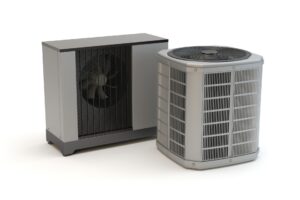Choosing the right air conditioning unit for your home or business can be a daunting task, especially if you’re not familiar with the different types of AC units available. Let’s explore some of the most important air conditioning installation ffactors to keep in mind when choosing your next AC unit.
Regular AC maintenance is crucial for keeping your system running smoothly and efficiently. Not only will routine care help your system deliver optimal performance but also improve indoor air quality, lower energy costs, and prevent costly repairs down the road. Here are some practical maintenance tips: check your thermostat settings, clean or replace the air filter regularly, and inspect for poor airflow or unusual noises.
Annual AC maintenance, including scheduling an AC tune up, is essential to ensure your system operates reliably throughout the year. Whether you choose to handle some maintenance tasks yourself or schedule an AC tune up as part of your annual AC maintenance, staying proactive can help extend the lifespan of your unit and maintain warranty requirements. Regular AC maintenance is key to keeping your system running smoothly and efficiently, helping you avoid unexpected breakdowns and costly repairs.
Introduction to AC Systems
An air conditioning system, often simply called an air conditioner or AC, is essential for keeping your home or business comfortable during the hottest months of the year. Beyond just delivering cool air, a well-functioning air conditioning system helps maintain a pleasant indoor environment and supports your overall well-being.
To keep your air conditioner running at its best, regular air conditioner maintenance is a must. This includes tasks like cleaning or replacing air filters, inspecting and cleaning condenser coils, and checking refrigerant levels. Preparing your air conditioner before summer includes inspecting air filters and cleaning the outdoor unit. Regular maintenance of air conditioner’s filters, coils, fins, and refrigerant lines ensures efficient and effective performance. These steps not only help your system deliver optimal performance but also improve indoor air quality, lower energy costs, and prevent costly repairs down the road.
Whether you choose to handle some maintenance tasks yourself—such as cleaning the air filter or checking the condensate drain line—or rely on a licensed HVAC professional for annual AC tune ups, staying on top of regular air conditioner maintenance is key. Scheduling annual AC tune ups ensures your system runs smoothly and efficiently throughout the cooling season, helping you save money and enjoy reliable comfort all summer long. Additionally, many HVAC manufacturers require annual maintenance to keep warranties intact.
Types of AC Units: Pros, Cons & Choosing the Right One
It’s not as simple as, “I want cooler air.” How do you want it? Which system makes the most sense for your preferences, home, and family?
This is the first step because until you know how you want your home cooled, you can’t really proceed. Choose from geothermal systems, heat pumps (which do provide heating as well), ductless mini splits, or central systems. Central systems are integrated into your home’s infrastructure and often require extensive ductwork to distribute cool air throughout multiple rooms. Learn about the pros and cons of each before making your decision. If you’re facing frequent breakdowns with your current setup, considering your AC’s future at the end of summer might help you weigh your replacement options more confidently.
Key Components
Understanding the key components of your air conditioning system can help you appreciate how it keeps your home cool and comfortable. The main parts include the indoor unit (or air handler), the outdoor unit (also known as the condenser unit), condenser coils, the evaporator coil, and refrigerant lines.
The indoor unit houses the blower motor, which is responsible for circulating cool air throughout your living spaces. Meanwhile, the outdoor unit contains the condenser coils, which play a crucial role in releasing heat absorbed from inside your home. Keeping these condenser coils clean is vital for proper airflow and maintaining your system’s efficiency. Use a soft brush to clean AC coils and remove dust and dirt buildup to maintain efficiency.
Refrigerant lines connect the indoor and outdoor units, allowing the refrigerant to move between the evaporator coil and condenser coil, absorbing and releasing heat as needed. Regular inspections and maintenance by a qualified HVAC contractor can ensure all these components—including electrical components—are in good working order, helping your air conditioning system deliver reliable cool air when you need it most. Inspecting and cleaning the condensate drain line is also crucial to prevent clogging and backflow issues. Blocked condensate drains can reduce the unit’s ability to remove condensed water from the system.
How to Match Cooling Capacity with Your Home’s Needs
We measure the capacity of air conditioners and heaters with British thermal units or BTUs. If you’ve ever purchased a window air conditioner or space heater before, you may remember a BTU rating on the box.
The more BTUs, the higher capacity that unit has. The reason this is important is because you don’t want an air conditioner that has too few BTUs for your home. Otherwise, it will work to cool your space, not meet demand, and run continuously until it burns out. To better understand when it’s time to stop repairing your AC and consider replacing it, check out this detailed guide on when to stop AC repairs and get a new one.
Picking a High-Efficiency AC to Save Money
New appliances should come with improved energy efficiency over old models, but it’s not so black and white. One brand of air conditioner may be more efficient than a rival brand, even if those AC models were made in the same year.
Once you know what your energy goals are with your new air conditioner, you can approach which air conditioner you want based on its energy profile.
Air Quality Considerations
When considering air quality, it’s important to regularly clean or replace air filters. Maintaining air conditioner filters and ensuring you have a clean filter helps prevent dust buildup and dirt buildup, which can obstruct airflow and reduce indoor air quality. Cleaning the indoor unit can prevent poor system performance caused by dust and mold buildup. Regular filter maintenance also helps prevent dirt from bypassing the filter and causing potential damage to your HVAC system.
Blocked airflow can lead to reduced system performance. A dirty filter can cause poor airflow and reduce the system’s efficiency, making your air conditioner work harder. Regular filter maintenance can help lower utility bills and cooling costs by improving efficiency and preventing breakdowns.
Thermostat Options
Modern air conditioners often come with programmable thermostats. Adjusting thermostat settings to achieve the desired temperature can improve energy efficiency and help you maintain comfort while reducing energy consumption.
Air Quality Considerations
Indoor air quality is a major factor in creating a healthy and comfortable home environment, and your air conditioning system plays a big part in this. Regular air conditioner maintenance, especially cleaning or replacing air filters, helps remove dust, dirt, and other airborne pollutants, leading to cleaner, fresher air indoors.
A clogged or dirty air filter can block airflow, forcing your system to work harder and resulting in increased energy consumption and reduced indoor air quality. To keep your air conditioning system running efficiently and maintain good air quality, it’s important to replace air filters every 1-3 months, depending on usage and manufacturer guidelines.
For even better results, a qualified HVAC technician can inspect your system and suggest ways to further improve indoor air quality, such as installing a programmable thermostat or upgrading to a more advanced air conditioning system. By prioritizing regular air conditioner maintenance, you’ll enjoy cleaner air, lower energy bills, and a more comfortable home.
Noise Level Considerations
When choosing an air conditioning system, noise level is an important factor to consider. A quiet system ensures that you can enjoy cool air without the distraction of constant humming or rattling. A well-maintained air conditioning system should operate smoothly and quietly, blending into the background of your daily life.
Regular maintenance, such as cleaning the condenser coils and checking the fan motor, can help keep noise levels down and prevent potential issues. If you notice your system becoming louder, it’s wise to consult a qualified HVAC contractor. They can recommend solutions like installing a sound blanket or upgrading to a more efficient, quieter model. Additionally, remove any debris or vegetation that might block airflow around the outdoor unit to ensure optimal performance.
Addressing noise concerns early not only improves your comfort but can also help you avoid costly repairs by catching problems before they escalate. Keeping your air conditioning system in top shape ensures you get the cool air you need—without the unwanted noise.
Thermostat Options
The thermostat is the control center of your air conditioning system, allowing you to set and adjust the temperature to your liking. Today’s market offers a range of thermostat options, including programmable thermostats, smart thermostats, and Wi-Fi-enabled models.
A programmable thermostat can help you save on energy costs by letting you schedule temperature changes based on your daily routine. Smart thermostats take it a step further, learning your preferences and automatically adjusting settings for optimal comfort and energy efficiency.
Choosing the right thermostat for your needs and budget can make a big difference in how efficiently your air conditioning system operates. A qualified HVAC contractor can help you select and install the best thermostat for your home, ensuring seamless integration and easy control over your indoor climate. With the right thermostat, you’ll enjoy greater comfort, lower energy bills, and a more efficient air conditioning system.
Planning Your AC Installation and Service Timeline
Now that you’ve chosen the parameters of what a good AC system looks like for you, it’s time to figure out installation. An air conditioner installation can take a full day, sometimes two or more if you need completely new ductwork.
This is why a pre-installation appointment is made. That way, a technician can make sure the sizing for your new AC makes sense and they can plan out how the installation will go.Once the installation is complete, you need to schedule annual maintenance. An annual tune up and annual AC maintenance for both your cooling system and heating system are essential parts of a comprehensive HVAC system care plan. AC maintenance includes inspecting the outdoor condenser coil and indoor evaporator coil, as well as checking for refrigerant leaks. HVAC technicians perform these tune ups and can use tools like a vacuum cleaner to clear the condensate drain line. Scheduling maintenance during the off season can also help you save on costs. Regular AC maintenance is essential for system longevity. Without maintenance, your air conditioner can easily fall into disrepair (and it can happen much faster than you think). If you’re unsure about how long your AC is expected to last, this helpful article explains how AC maintenance reduces repair needs. Planning a maintenance schedule from the moment of installation is critical to the longevity of your air conditioner. A tune-up takes about one hour on average, not including repairs. Most homeowners pay an average of around $130 for annual AC tune-ups.
Final Tips to Make the Smartest AC Choice
Choosing the right AC for your home is an important buying decision, one that can’t be swapped out for years (unless you want to throw money down the drain). It’s important to get it right the first time. To explore whether you should repair or replace your current unit, this resource on deciding between repair or replacement can guide you in making an informed decision.
Let’s get an HVAC technician out to help size the right AC for your home as soon as possible and make sure you’re making the best possible investment in your home that you can.
Contact Crown Group Ohio today to schedule your next AC unit installation as soon as possible.



